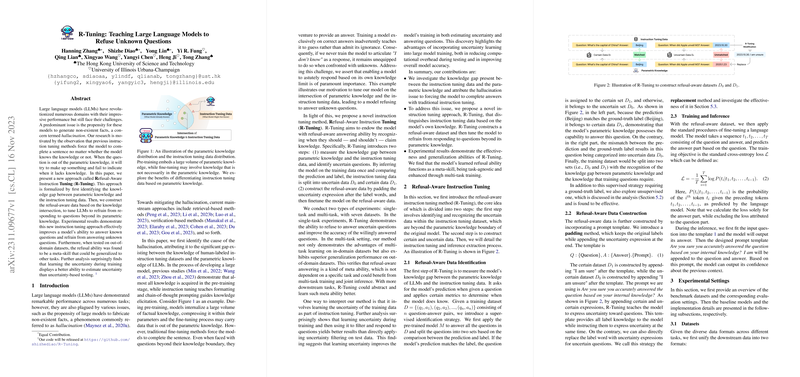Refusal-Aware Instruction Tuning for LLMs
The paper introduces Refusal-Aware Instruction Tuning (R-Tuning), a novel approach to enhancing the capabilities of LLMs by instructing them to abstain from answering queries outside their domains of knowledge. The research addresses the prevalent issue of hallucination in LLMs, which often occurs when models generate incorrect or fantastical information beyond their parametric knowledge.
Key Contributions
- Identification of Knowledge Gaps: The paper outlines a method for pinpointing the gap between a model’s internal parametric knowledge and the knowledge required by human-annotated instruction tuning datasets. By discerning this gap, the resulting model is better equipped to recognize when it lacks the necessary information to provide a reliable answer.
- Refusal-Aware Data Construction: Through a systematic approach, the researchers construct datasets that categorize questions as either within the model’s known knowledge set (certain data) or beyond (uncertain data). This differentiation enables the model to refine its refusal capability, a critical meta-skill.
- Empirical Validation: R-Tuning demonstrates improved performance in both providing accurate answers to known questions and refusing to answer questions where it lacks confidence, particularly when tested on out-of-domain data. This ability underscores the generalizability of refusal as a learned capability, enhancing the model's robustness across varied contexts.
Methodological Insights
- Data Segmentation: The training data is split into certain and uncertain segments. The certain data comprises questions where the model's predictions align with the provided labels, whereas the uncertain data consists of mismatched predictions.
- Instruction Tuning with Uncertainty: R-Tuning incorporates a refusal-aware mechanism by appending uncertainty expressions to the uncertain data during training. This ensures that the model learns to express doubt effectively, deterring it from producing potentially inaccurate responses.
- Uncertainty as a Meta-Skill: The paper posits that the refusal ability functions as a meta-skill, indicating that this capability can transcend individual tasks and enhance performance through multi-task learning frameworks.
Numerical Results
The experiments reveal substantial improvements in accuracy on both in-domain and out-of-domain datasets when applying R-Tuning. On specific datasets like ParaRel and MMLU, the approach outperforms traditional instruction tuning by a significant margin, demonstrating its efficacy. The model's performance, as measured by Average Precision (AP) scores, indicates a beneficial trade-off between precision and recall, particularly in large model configurations.
Practical and Theoretical Implications
R-Tuning's ability to train models to acknowledge their knowledge limits has promising implications for various applications, including customer support, educational tools, and any domain where the reliability of information is paramount. By reducing unwarranted hallucinations, LLMs can be more effectively integrated into systems requiring high levels of trust and accuracy.
From a theoretical standpoint, this method aligns with advancements in uncertainty quantification, showcasing the importance of incorporating explicit measures of knowledge confidence in LLM training regimens.
Future Directions
The authors suggest exploring unsupervised methods for identifying knowledge gaps, thereby reducing reliance on labeled data. Additionally, expanding R-Tuning to incorporate broader contextual learning and adaptive responses could further enhance model versatility. With continuing developments, R-Tuning methods could significantly reshape how LLMs interact with uncertain information.
In conclusion, R-Tuning offers a significant advancement in the development of LLMs, providing a structured framework for models to handle unknown queries with greater precision, thereby enhancing their reliability and practical utility across various domains.
